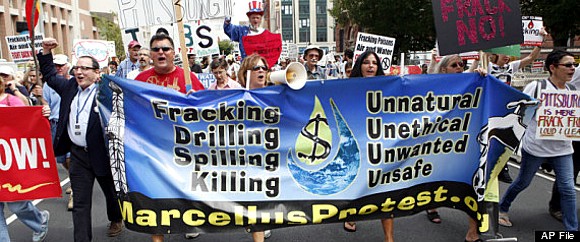Study Finds Communities Exposed To Fracking Have More Fetal and Childhood Health Problems
 December 12, 2013
December 12, 2013  Kyriaki (Sandy) Venetis
Kyriaki (Sandy) Venetis As the oil and gas industry look for ever cheaper ways to extract resources from deeper pockets of shale, communities are increasingly taking measures to battling back with restrictions, bans, and moratoriums against controversial extraction practices known as fracking.
Fracking, also called hydraulic fracturing or hydrofracking, is the process of forcing a mixture of freshwater and toxic chemicals under high pressure into a well, enlarging the rock fracture to increase the extraction of oil and gas.
 Anti-fracking protesters on the march in Pennsylvania. Photo courtesy of the Huffington Post.
Anti-fracking protesters on the march in Pennsylvania. Photo courtesy of the Huffington Post.
The Center for Environmental Health (CEH) reports that fracking exposes communities – among the most vulnerable being pregnant women, their unborn fetuses, and young children – to a cocktail of chemicals and substances, including: methane, BTEX (benzene, toluene, ethylbenzene, and xylenes), arsenic, radium, ozone, formaldehyde, radon, nitrogen oxides, methylene chloride, and silica sand.
“These substances are associated with low birth weight, birth defects, respiratory problems, cancer and fertility problems, said the CEH in a report that looked at the health and social effects on communities when fracking is introduced.
The report specifically focused air and water pollution associated with fracking, as well as the social impacts. Focusing on the sheer pollution, it found that “every part of the fracking process” from well construction to operations to transportation can threaten the health of a community.
The report found that pollution can occur in several ways, including from the production and transporting of materials to and from development sites (such as sand mining and trucking wastewater); emissions from drilling and fracking equipment; and equipment used in gas production, processing, transmission, and distribution.
Some of the chemicals that have leached into drinking water from tight oil and shale development sites, include: methane, BTEX, arsenic, and radium. Each of these chemicals have their own particular sort of threat to nearby human populations.
Methane can be flammable and explosive, and when trapped in confined spaces, like a home or garage, can cause suffocation, unconsciousness, and death. For residents near fracking sites, this is a real concern because of the likely direct impacts to them.
The CEH found in a study of 68 drinking wells in Pennsylvania and New York that methane contamination rose significantly with increasing proximity to fracking sites.
